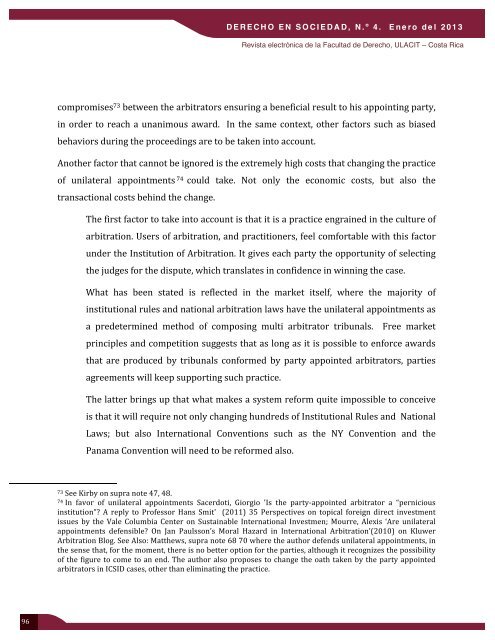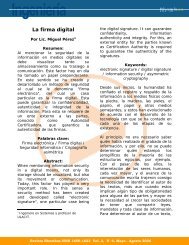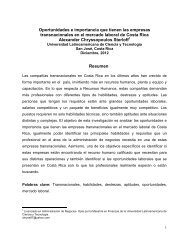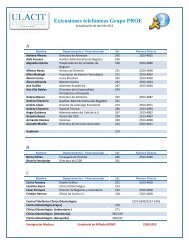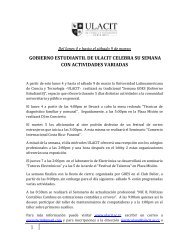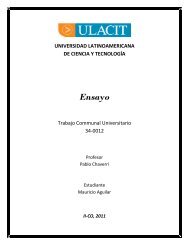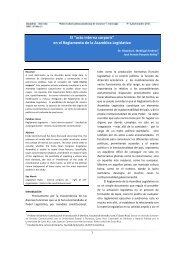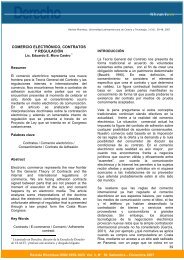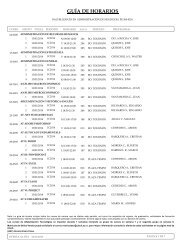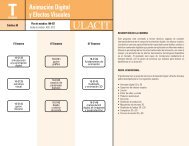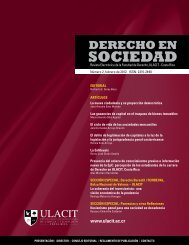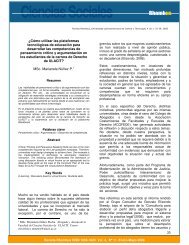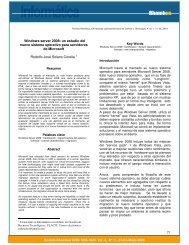IV Edición Revista Derecho en Sociedad - Ulacit
IV Edición Revista Derecho en Sociedad - Ulacit
IV Edición Revista Derecho en Sociedad - Ulacit
You also want an ePaper? Increase the reach of your titles
YUMPU automatically turns print PDFs into web optimized ePapers that Google loves.
DERECHO EN SOCIEDAD, N. º 4 . Enero del 2013<br />
<strong>Revista</strong> electrónica de la Facultad de <strong>Derecho</strong>, ULACIT – Costa Rica<br />
compromises 73 betwe<strong>en</strong> the arbitrators <strong>en</strong>suring a b<strong>en</strong>eficial result to his appointing party, <br />
in order to reach a unanimous award. In the same context, other factors such as biased <br />
behaviors during the proceedings are to be tak<strong>en</strong> into account. <br />
Another factor that cannot be ignored is the extremely high costs that changing the practice <br />
of unilateral appointm<strong>en</strong>ts 74 could take. Not only the economic costs, but also the <br />
transactional costs behind the change. <br />
The first factor to take into account is that it is a practice <strong>en</strong>grained in the culture of <br />
arbitration. Users of arbitration, and practitioners, feel comfortable with this factor <br />
under the Institution of Arbitration. It gives each party the opportunity of selecting <br />
the judges for the dispute, which translates in confid<strong>en</strong>ce in winning the case. <br />
What has be<strong>en</strong> stated is reflected in the market itself, where the majority of <br />
institutional rules and national arbitration laws have the unilateral appointm<strong>en</strong>ts as <br />
a predetermined method of composing multi arbitrator tribunals. Free market <br />
principles and competition suggests that as long as it is possible to <strong>en</strong>force awards <br />
that are produced by tribunals conformed by party appointed arbitrators, parties <br />
agreem<strong>en</strong>ts will keep supporting such practice. <br />
The latter brings up that what makes a system reform quite impossible to conceive <br />
is that it will require not only changing hundreds of Institutional Rules and National <br />
Laws; but also International Conv<strong>en</strong>tions such as the NY Conv<strong>en</strong>tion and the <br />
Panama Conv<strong>en</strong>tion will need to be reformed also. <br />
73 See Kirby on supra note 47, 48. <br />
74 In favor of unilateral appointm<strong>en</strong>ts Sacerdoti, Giorgio 'Is the party-‐appointed arbitrator a “pernicious <br />
institution”? A reply to Professor Hans Smit' (2011) 35 Perspectives on topical foreign direct investm<strong>en</strong>t <br />
issues by the Vale Columbia C<strong>en</strong>ter on Sustainable International Investm<strong>en</strong>; Mourre, Alexis ‘Are unilateral <br />
appointm<strong>en</strong>ts def<strong>en</strong>sible? On Jan Paulsson’s Moral Hazard in International Arbitration’(2010) on Kluwer <br />
Arbitration Blog. See Also: Matthews, supra note 68 70 where the author def<strong>en</strong>ds unilateral appointm<strong>en</strong>ts, in <br />
the s<strong>en</strong>se that, for the mom<strong>en</strong>t, there is no better option for the parties, although it recognizes the possibility <br />
of the figure to come to an <strong>en</strong>d. The author also proposes to change the oath tak<strong>en</strong> by the party appointed <br />
arbitrators in ICSID cases, other than eliminating the practice. <br />
96


